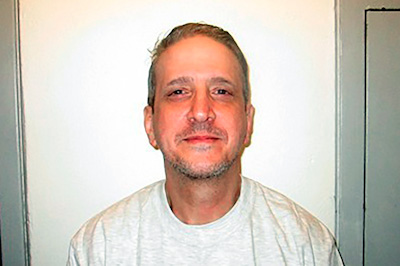Supreme Court stays execution of inmate who won support from Oklahoma AG

Death row inmate Richard Glossip on Feb. 19, 2021. The U.S. Supreme Court on May 5 blocked Oklahoma from executing Glossip after the state’s attorney general agreed that his life should be spared. Photo by the Oklahoma Department of Corrections via the Associated Press.
The U.S. Supreme Court on Friday stayed the execution of an Oklahoma inmate after the state attorney general said he supported vacating the conviction.
In a May 5 order, the Supreme Court stayed the execution of Richard Glossip pending disposition of his petition for certiorari.
The New York Times, CNN and the Washington Post have coverage.
“Absent this court’s intervention, an execution will move forward under circumstances where the attorney general has already confessed error—a result that would be unthinkable,” said Republican Oklahoma Attorney General Gentner F. Drummond in a response filed with the Supreme Court.
Glossip was convicted in the 1997 murder of Barry Van Treese, the owner of an Oklahoma City motel where Glossip worked, after motel handyman Justin Sneed claimed that Glossip promised to pay him $10,000 to carry out the killing. Sneed, a drug user with a history of violence and a criminal record, pleaded guilty to beating Van Treese to death with a baseball bat.
Two independent investigations—one carried out on behalf of lawmakers and the other on behalf of the state attorney general—found problems with the prosecution.
The first investigation, carried out pro bono by Reed Smith lawyers, found that Sneed implicated Glossip after detectives mentioned Glossip’s name six times. Sneed received a life sentence for agreeing to implicate Glossip, and he later asked his lawyers about recanting his testimony, according to a report addendum.
In his trial testimony, Sneed said he was given lithium after he asked for cold medicine, and he didn’t know why because he had never seen a psychiatrist. In reality, Sneed was apparently treated for bipolar affective disorder in 1997, and the lithium was prescribed for mental illness. Prosecutors did not try to correct the testimony.
In addition, key physical evidence and potentially exculpatory financial documents were destroyed before a retrial of Glossip, according to the Reed Smith report. Other critical evidence, including video from a nearby Sinclair Gas Station, appeared to be lost.
The state attorney general had confessed error to the Oklahoma Court of Criminal Appeals, which nonetheless refused to grant a new trial. The state parole board split 2-2 on clemency, which had the effect of preventing the Oklahoma governor from commuting Glossip’s sentence to life without parole.
Drummond had told the parole board that he doesn’t think that the evidence shows that Glossip is guilty beyond a reasonable doubt. But Drummond said he thinks that Glossip is at least guilty of being an accessory to murder after the fact and is likely guilty of murder, according to CNN.
Glossip’s supporters include Kim Kardashian and a bipartisan group of 62 Oklahoma lawmakers.



